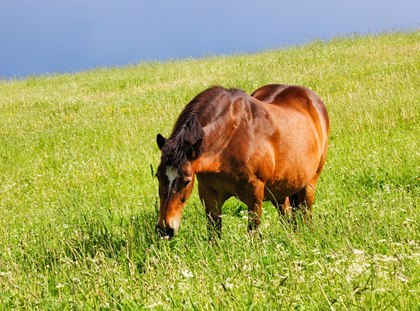
It’s easy for horse owners to say their horse is just a little overweight, or big boned, but it’s difficult for them to recognize that their horse might be seriously overweight or even obese. Carrying too much weight can create serious health concerns for your horse, and it’s ultimately up to you as an owner to fix the situation.
Obesity is linked to insulin resistance, laminitis, developmental orthopedic disease, osteoarthritis, lameness, poor cardiovascular conditioning, and several other ailments.
The first step towards helping your horse lose weight is recognizing just how overweight they are. Assess your horse’s body condition score (BCS) and determine how far they are away from the ideal BCS of 5. For tips on body condition scoring, read Dr. Bray’s article here.
For your horse to lose weight, they need to be in a caloric deficit. That means they are burning more calories than they are consuming each day. Consider your horse’s activity level when feeding. A more active horse will require more calories than a sedentary horse. But even an active horse can be fed too much and be overweight.
Develop a weight management plan with your trusted equine veterinarian and nutritionist. Set realistic goals and keep in mind that changes will be gradual. Here are some key components of a weight management plan:
Increase exercise
This can be as simple as moving your horse from a stall to a larger pasture, or more structured like increasing the frequency they are ridden or lunged.
Restrict grazing
A properly fitting grazing muzzle can work wonders for an overweight horse living on pasture. It will limit the amount of grass your horse can consume by slowing them down and making them take smaller bites of grass.
Choose the right forage and feeding amounts
Choose a hay that is high in fiber and low in energy. This will help your horse feel full without adding extra calories. Alfalfa is not an ideal choice for the overweight horse. Instead, choose a mature grass hay. Feed 1 – 1.5% of your horse’s body weight in forage per day, split in to as many meals as possible.
Hold back on grains
When adding a balanced feed supplement to your horse’s forage, avoid grains. Look for a feed that contains essential nutrients, vitamins, and minerals your horse needs, with a high fiber content. Consider feeding Integrity Lite, available with our without molasses. Its nutrition profile makes is a great choice for overweight horses, or horses that are less active and require less calories in their diet.
Increase feeding time
Encourage your horse to spend more time eating. Using a haynet with small openings, or doubling up on haynets, will keep your horse from taking big bites of food. Remember that a horse’s digestive system is designed to be eating small amounts of food over long period of time. Anything you can do to help your horse eat this way, will help them maintain a proper weight and healthy digestion.
Most importantly, stay consistent. Reevaluate your horse’s BCS every few weeks, and make sure they stay on track.

